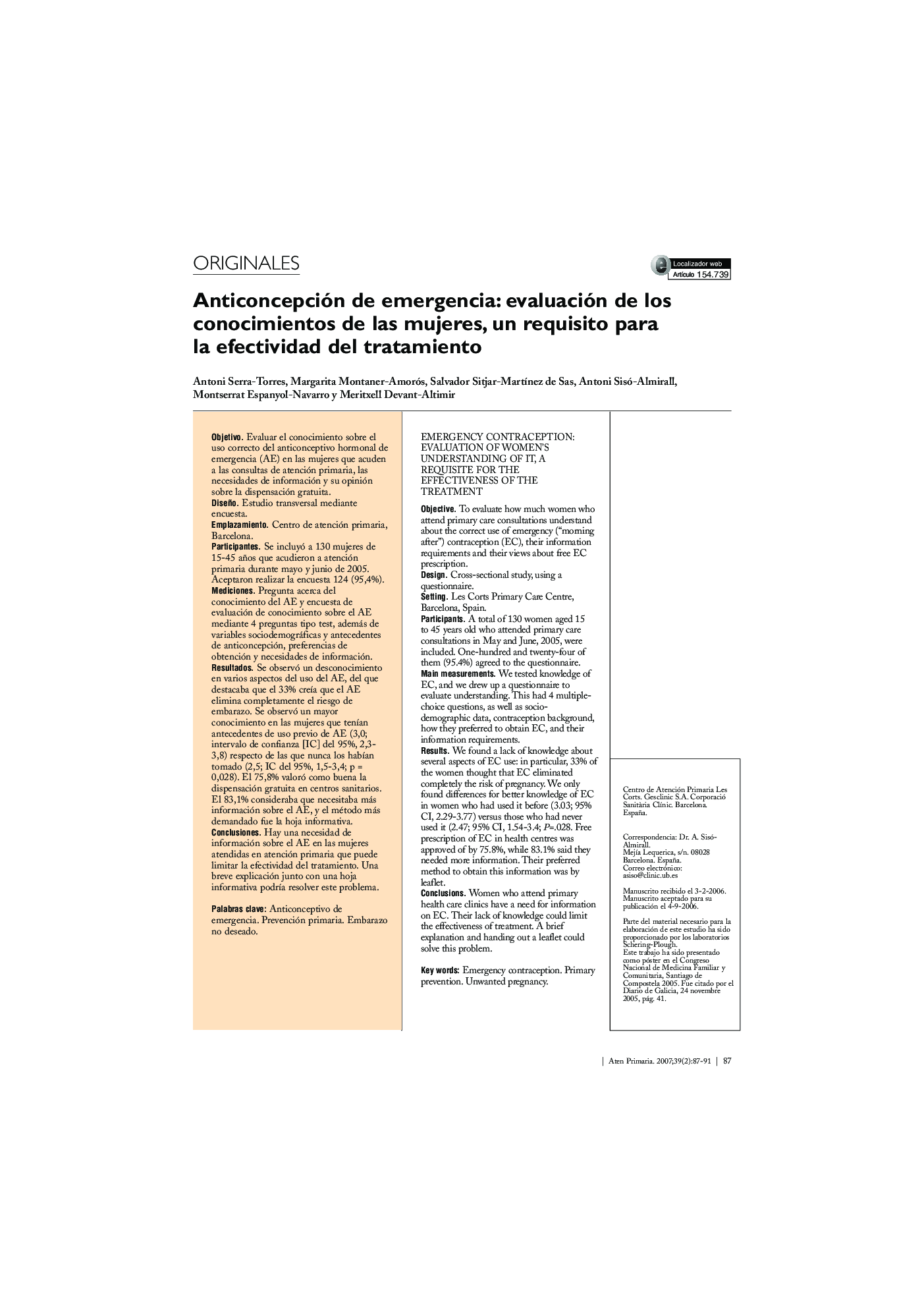| کد مقاله | کد نشریه | سال انتشار | مقاله انگلیسی | نسخه تمام متن |
|---|---|---|---|---|
| 3459103 | 1231056 | 2007 | 5 صفحه PDF | دانلود رایگان |

ObjetivoEvaluar el conocimiento sobre el uso correcto del anticonceptivo hormonal de emergencia (AE) en las mujeres que acuden a las consultas de atención primaria, las necesidades de información y su opinion sobre la dispensación gratuita.DiseñoEstudio transversal mediante encuesta.EmplazamientoCentro de atención primaria, Barcelona.ParticipantesSe incluyó a 130 mujeres de 15-45 años que acudieron a atención primaria durante mayo y junio de 2005. Aceptaron realizar la encuesta 124 (95,4%).MedicionesPregunta acerca del conocimiento del AE y encuesta de evaluación de conocimiento sobre el AE mediante 4 preguntas tipo test, además de variables sociodemográficas y antecedents de anticoncepción, preferencias de obtención y necesidades de información.ResultadosSe observó un desconocimiento en varios aspectos del uso del AE, del que destacaba que el 33% creía que el AE elimina completamente el riesgo de embarazo. Se observó un mayor conocimiento en las mujeres que tenían antecedentes de uso previo de AE (3,0; intervalo de confianza [IC] del 95%, 2,3-3,8) respecto de las que nunca los habían tomado (2,5; IC del 95%, 1,5-3,4; p = 0,028). El 75,8% valoró como buena la dispensación gratuita en centros sanitarios. El 83,1% consideraba que necesitaba más información sobre el AE, y el método más demandado fue la hoja informativa.ConclusionesHay una necesidad de información sobre el AE en las mujeres atendidas en atención primaria que puede limitar la efectividad del tratamiento. Una breve explicación junto con una hoja informativa podría resolver este problema.
ObjectiveTo evaluate how much women who attend primary care consultations understand about the correct use of emergency (“morning after”) contraception (EC), their information requirements and their views about free EC prescription.DesignCross-sectional study, using a questionnaire.SettingLes Corts Primary Care Centre, Barcelona, Spain.ParticipantsA total of 130 women aged 15 to 45 years old who attended primary care consultations in May and June, 2005, were included. One-hundred and twenty-four of them (95.4%) agreed to the questionnaire.Main measurementsWe tested knowledge of EC, and we drew up a questionnaire to evaluate understanding. This had 4 multiple-choice questions, as well as sociodemographic data, contraception background, how they preferred to obtain EC, and their information requirements.ResultsWe found a lack of knowledge about several aspects of EC use: in particular, 33% of the women thought that EC eliminated completely the risk of pregnancy.We only found differences for better knowledge of EC in women who had used it before (3.03; 95% CI, 2.29-3.77) versus those who had never used it (2.47; 95% CI, 1.54-3.4; P=.028. Free prescription of EC in health centres was approved of by 75.8%, while 83.1% said they needed more information. Their preferred method to obtain this information was by leaflet.ConclusionsWomen who attend primary health care clinics have a need for information on EC. Their lack of knowledge could limit the effectiveness of treatment. A brief explanation and handing out a leaflet could solve this problem.
Journal: Atención Primaria - Volume 39, Issue 2, February 2007, Pages 87-91